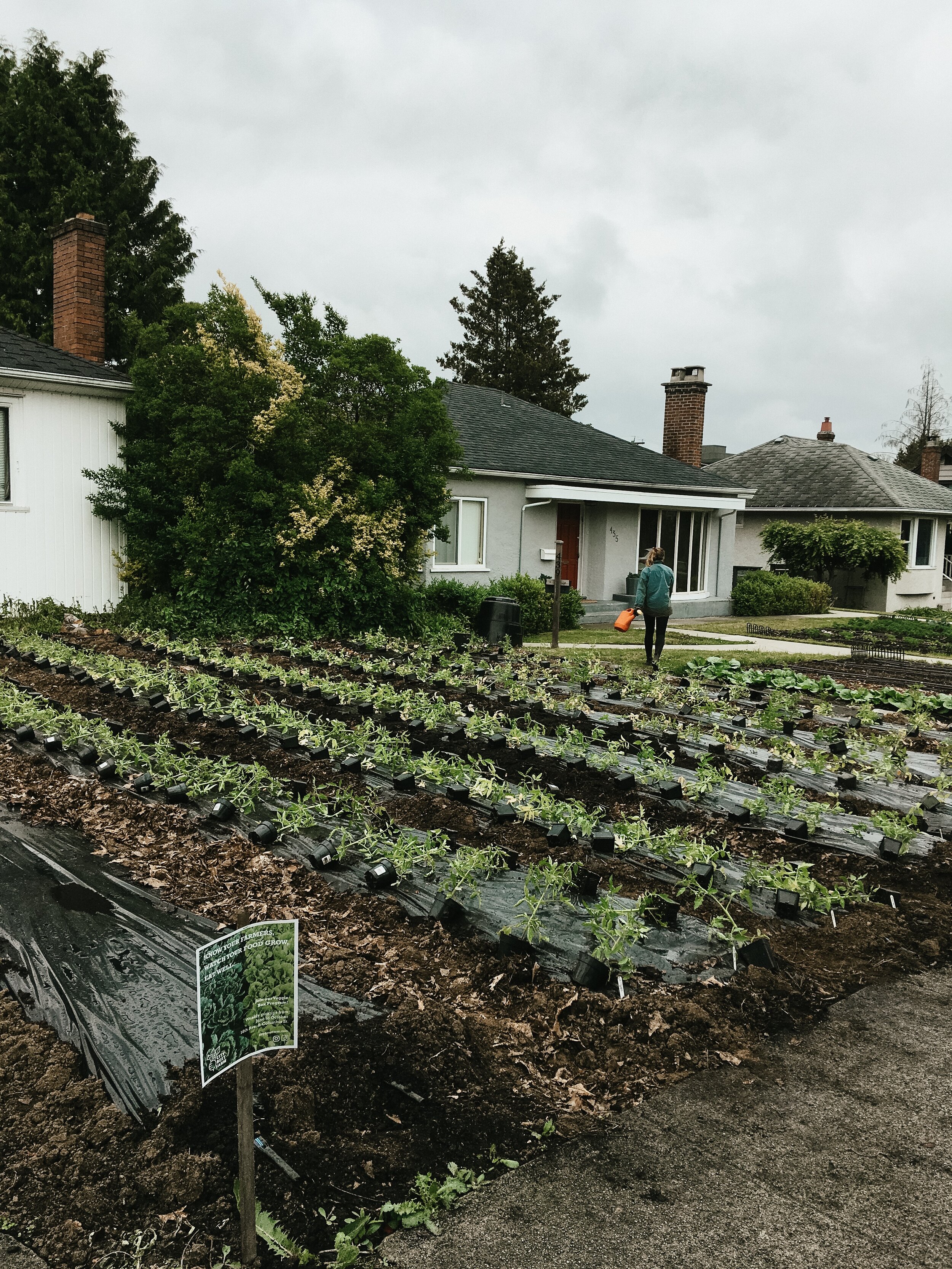Redefining Our Food System with Maddy Clerk
One of City Beet Farm’s front yard plots, credit: Elana Evans
“It’s really important for people to get as close to their food as they can.”
What does it mean to be close to your food? Our lives revolve around food – shopping, preparing, eating, and then cleaning up the mess. It is such an integral part of our daily activities, yet how often do we take a minute to really think about where it came from and the impact it has?
My conversation with Maddy Clerk, who co-owns the local and small-scale City Beet Farm, dove into the connection between consumers and food. We discussed how a true understanding of this relationship can change the way we see our food and even how we eat.
Maddy explains that this requires “a mindfulness of what you’re putting in your body and what its impact on the environment, land and people is.”
There is actually a whole movement working to build and restore this food to consumer connection called ‘Slow Food’. This concept doesn’t refer to the speed at which you eat, but to the care you devote to your entire food experience. This food experience includes the origin of your food, what it means to you and the impact it has on the world.
Maddy explains what slow food means to her:
Maddy in her happy place among the tomatoes, credit: Elana Evans
“For me that’s growing food and connecting my community to the land. While I recognize that it won’t be that way for everyone, I think that self-sufficiency is important. For most, it means connecting with your farmer and really understanding where your food comes from - when people start to do that they start to change their eating habits just because their relationship to food changes so much.”
How do you connect with your farmer and begin this farm to fork connection? Maddy suggests “getting as close to your food as possible which means going to the farmer’s markets and supporting small-scale farmers.”
Knowing where your food comes from and having access to local food is a key element of a sustainable food system. Just Food, a non-profit organization based out of Ottawa, envisioned what this kind of system would look like:
“all people, at all times, have physical and economic access to sufficient, safe, nutritious and culturally acceptable food for an active and healthy life;
essential principles are upheld: ecologically regenerative practices, viable livelihoods for food providers, and social justice for all;
the local population actively participates in the decision-making processes related to food at a municipal, regional, and national levels;
people have the desire, opportunity, and means to actively engage in all aspects of the food system; and
food is celebrated as central to both culture and community.”
A greenhouse set up at one of City Beet Farm’s sites, credit: Elana Evans
While some of these ideas may seem intuitive, unfortunately this is not a reality in most places around the world. Many people live in what are called food deserts – locales with limited access to affordable and nutritious food. Lower-income and marginalized individuals are the most likely to suffer from this phenomenon. The Greater Vancouver Food Bank set up the Curbside Fresh mobile market to combat this by operating pop-up markets of affordable produce in communities such as South Granville.
So how do we make something like what Just Food described become a reality in our communities?
Maddy encourages “educating yourself, getting involved, maintaining a critical perspective - particularly around what you’re hearing in the media - talking to your farmers and understanding what you’re putting in your body.”
Fresh flowers at the Coquitlam Farmers Market, credit: Teghan Acres
Educating yourself can be as easy as consciously noticing where your produce was grown when you pick it up at the grocery store. You can also read blogs such as We Heart Local BC or books such as ‘The Third Plate’ by Dan Barber that dive into these topics deeper.
Getting involved can be through visiting your local farmers market or going to community events such as these workshops hosted by Nada. Explore the BC Farmers Market Trail to find the closest market to you. There are also a variety of fantastic restaurants in Vancouver that are working to restore that local food connection. Here are resources to find Indigenous, vegan, and farm to table dining options.
Maddy gives an example of the critical lens we must keep when we discuss our personal diets:
“It’s not natural that we have the ability to go get an avocado or banana at any time of the year. Learning to eat seasonally is a really integral part of this conversation about sustainability. You become really connected to our environments and the seasonality of things as a farmer because you’re so aware of the weather changes and that really impacts how I eat now.” The We Heart Local BC website updates a list of seasonal foods each month as a great tool for finding locally sourced produce and proteins.
My backyard greenhouse and herb garden, credit: Teghan Acres
Maddy emphasizes that by practicing slow food habits and supporting local small-scale farming she combats some of the discouraging feelings that accompany working in sustainability: “supporting local and slow entrepreneurship which also means slow food – those are things that make me feel hopeful and excited.”
I don’t want to make this shift to a sustainable and just food system seem easy or as if it will happen overnight. This post is describing a very meaningful system change that requires a redefinition of how we understand and make choices about our food. Like the plants that nourish us begin from the ground up, the roots of this change will also need to be firmly planted in grassroots led community engagement and empowerment. The good news is this will be good for the health of our planet, our society and ourselves.




